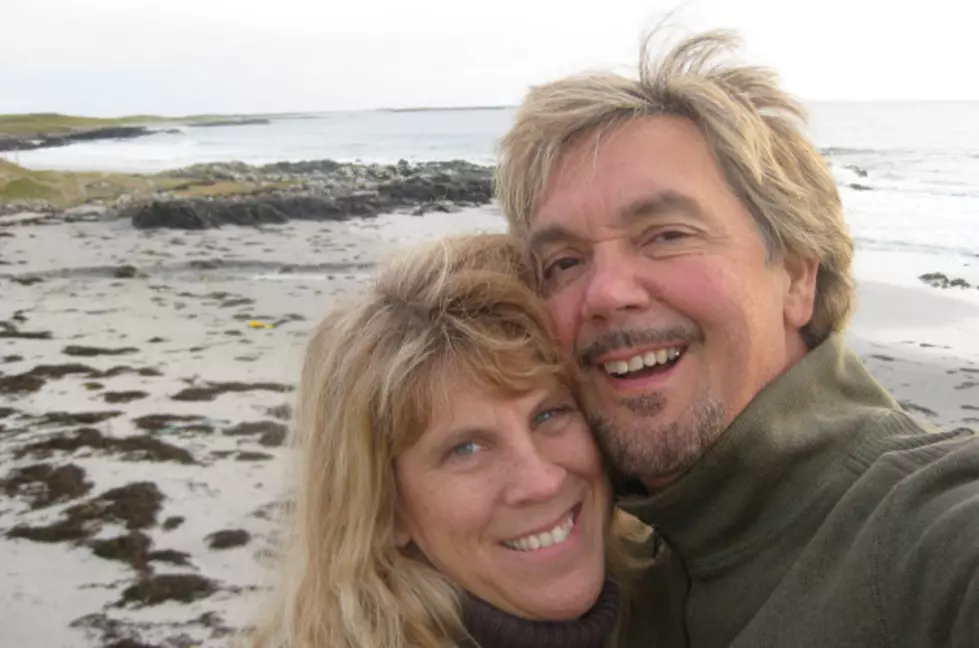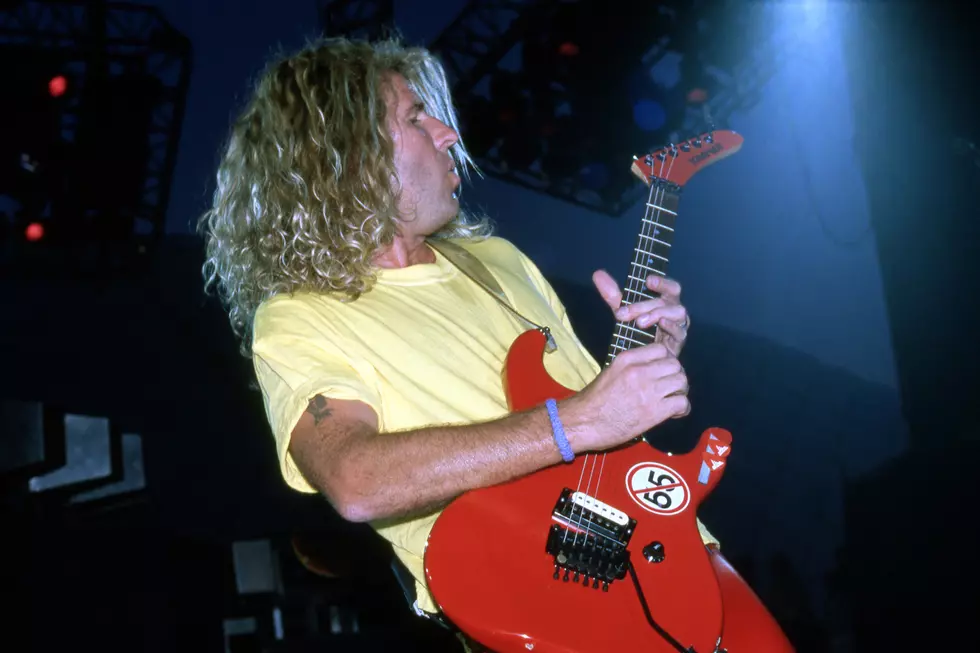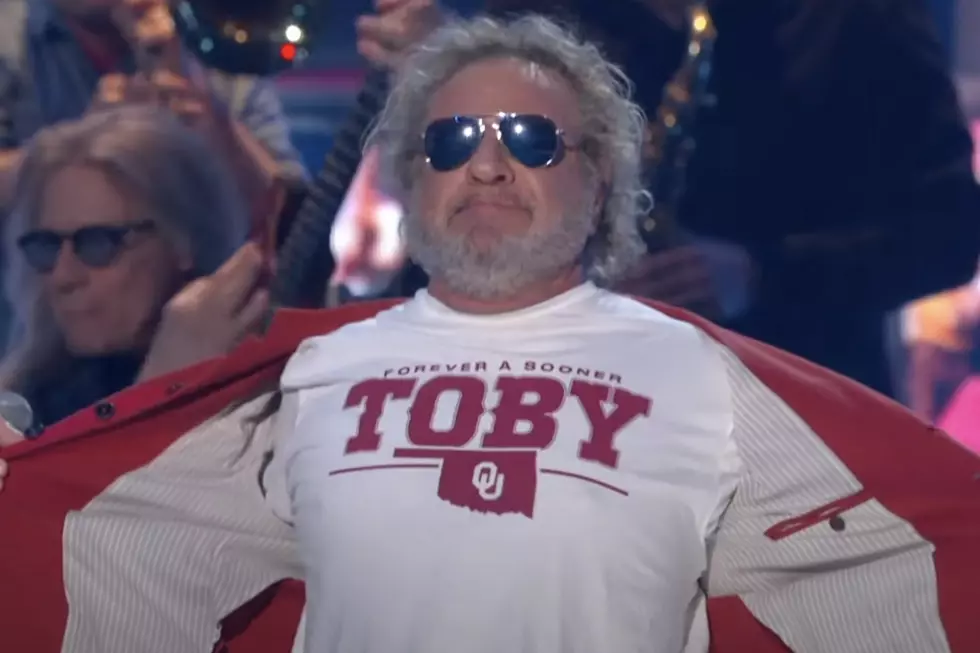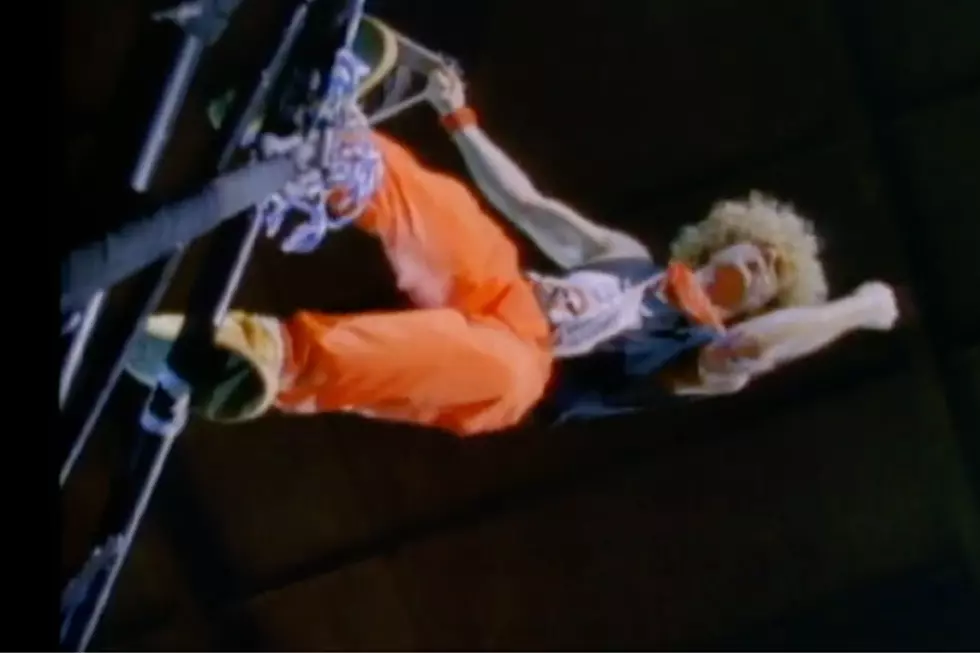
Sammy Hagar’s Drummer David Lauser On His Wife’s Brave Cancer Fight
For more than four decades, drummer David Lauser has provided the backbeat for Sammy Hagar, playing many gigs with the former Van Halen frontman in a variety of configurations. But for all the fun that entails, 2013 brought about Lauser’s most challenging gig to date. His wife Liza Cozad, who is also well-known in the Hagar fan community for her role in helping to develop Hagar's first website, was diagnosed in April with a brain tumor within her brainstem that’s inoperable.
A former professional tennis player, Cozad had begun to experience double vision, which revealed itself in a number of ways, including among other things, seeing two tennis balls instead of one when she was on the court. Cozad went to her eye doctor, who immediately recommended that she should go to see a neuro-opthamologist. After a series of tests, it was suggested that there could be a variety of things causing her double vision, as Lauser recalls, such as a small stroke in the eye muscle. But the situation was bizarre enough that the doctor suggested they should do an MRI examination.
Lauser was on the road when the call came in with the news and he remembers getting that phone call from Liza. “She said, ‘David, are you sitting down? I have a brain tumor in my brainstem.’ At that point, we didn’t know what that meant. All they told her was that it was inoperable, that it was in a place that was too dangerous to take a knife to. As you can imagine, the brainstem isn’t much thicker -- the girth of it might be like your thumb or your index finger.” The initial diagnosis from the doctors would give Liza an estimated six to 18 months to live.
“I came home for my break and me and Liza had our first face-to-face meeting with a doctor at Kaiser. It was a very nice lady from India, she’s probably in her early 30s and [the meeting was] really basically fatalistic. She gave us no hope and when I say that, she was pretty blunt. She said, ‘This is incurable and we can’t operate and we’re pretty sure that chemotherapy is not effective in this part of the body because of the blood/brain barrier.’ The blood/brain barrier protects your brain from infection -- but it’s a double-edged sword -- the medicine doesn’t get through in most cases”
“At least the doctors were frank enough to admit that the really caustic drugs that make you sick as a dog, lose your hair and fingernails, compromise your immune system and liver and everything -- they were saying, ‘Well, I wouldn’t really waste my time with that.’ But the only thing they offered us at that moment was radiation and they said that radiation will buy you possibly a year and in few cases, up to three years. And then the tumor will come back more aggressively and that’s it. So they said, ‘At least you might get a few good years before you die.’ Of course they also have to give us the list of side effects, which on the top of the list are, may exacerbate the problem and make it worse, blindness, lose your sense of taste, lose your hearing, become paralyzed, stroke, coma, etc. The typical one is that it’s going to cause swelling initially, because if you radiate a tissue, it’s going to hurt it.”
Lauser and his wife visited a number of cancer specialists over the past eight months including the Cleveland Clinic, John Hopkins, Duke University, UCSF and Stanford, among others. The process has cost more than $35,000 to date in travel and medical expenses. Those travels would finally bring a definitive diagnosis as far as the kind of brain tumor that Liza has. Cozad was diagnosed with an adult version of a child’s tumor, a Diffuse Intrinsic Pontine Glioma, often referenced in a shortened form as a D.I.P.G. The tumor is most common in children between the ages of five and 12. It’s very rare in adults -- only an estimated 20 adults over the age of 21 are diagnosed with this kind of tumor each year.
Despite her diagnosis, Liza displayed and continues to display an amazing amount of courage and willpower to fight against the cards that she’s been dealt. As Lauser relates, his wife was a workaholic at the time of the diagnosis, retired as an attorney to run three businesses, including two Curves locations and a business providing in-home care for senior citizens. With her illness, Cozad recognized right away that she needed to divest herself of all of her responsibilities so that she could focus on doing everything possible to get well and beat her diagnosis.
“She said to me, ‘David, something or somebody is telling me this is your signal to chill and focus on yourself.’ She started initially saying that, ‘this may be like a gift from God or a higher power for me to change my life, because I wasn’t happy. I’m stressed, I’m getting gray hair at an early age and now I’ve got this thing that’s saying ‘hey, you know what? You’re dying if you don’t change something.’ So she did."
She closed her businesses at a loss and I helped her sell all of this stuff -- it was a freakin’ nightmare. I think moving is probably one of the most brutal things on the planet, next to dying. So not only did we physically move, but she moved and vacated two businesses. Luckily, one of her clients bought one of the Curves from her so that we didn’t have to deal with all of that equipment. She sold everything and now she’s on a mission to focus on herself. Here’s a person that’s a workaholic and doesn’t like people doing stuff for her. It was a wake-up call.”
Lauser wanted to do as much as he could on his own before going to his close friends for help. “People think I’m a rock star that’s rich and it doesn’t work that way.” As a veteran sideman, Lauser certainly knows people, but he doesn’t have the songwriting credits that could deliver valuable financial help in this time of need. “We have bills and my credit cards are practically maxed.” Understanding that people are likely to see his position differently, he says that, “the deal is that you put your hand out and you have to explain to people where you are a little bit.”
Where things are at is that some of Cozad’s former co-workers and friends have set up a fundraising page which has helped to finance a large portion of the expenses to date. More than that, David and Liza discovered early on in their journey that there is an experimental drug called ANP which has a documented 27 percent success rate on her exact kind of tumor, and some of the best success stories related to the drug offer extreme promise. There are children who have been given access to the drug that are still cancer-free more than 20 years later.
Unfortunately for Cozad, the FDA had put a hold on new trial access to the drug as they had questions about procedures related to the medication. The FDA is allowing current patients to continue to be treated, but will not allow a new patient like Liza to receive the drug. Lauser and Cozad are seeking to get trial access under a Single Patient Protocol or Compassionate Use Exemption. They’ve launched a petition at Change.org to gather online signatures in support of their cause, with over 6,000 signatures gathered to date.
They have also understandably done a lot of research, reading a number of books to become better educated on all of the subjects that they’re dealing with. They had seen a movie about the Houston-based doctor, Dr. Stanislaw Burzynski [who developed the drug] nearly a year before Cozad was diagnosed. After her diagnosis, a repeat viewing of the movie seemed like a mirror image of what they were facing. A recent article in the New York Times reveals that they are far from being alone in their fight to gain access to something that could help make things better.
Cozad has been engaged in a number of alternative therapies to help address her present situation, including vitamin C treatments delivered intravenously and hyperbaric oxygen treatments. Presently, things are becoming more of a struggle for Cozad, as Lauser shares. “Aside from double vision, she’s also having a hard time swallowing and sometimes clearing her throat, I have to hit her on the back so she can clear her throat. She’s noticing hearing loss, and she’s not able to walk very well, or talk as clearly. She said that it’s like somebody’s got their hands around her throat and it doesn’t hurt, but it’s tightening in on her. Can you imagine living like that?"
The veteran drummer continues and says that “I’m over being freaked out talking about this stuff. I’m in survival mode and I’m in take care of business mode. But I would say probably for several months, there wasn’t a night or day that would go by where we didn’t hold each other and cry for a few moments. She’d wake up in the middle of the night bawling and I would wake up and we were just shot emotionally. Now, we have our moments, but it’s more like what do we do?”
She’s decided to get the radiotherapy that they had previously decided to avoid because of the side effects, as a way to buy more time. Lauser explains that, “she doesn’t want to be in a bed with an IV and a respirator [while] waiting for the FDA to give her something that may help.”
Ultimate Classic Rock spoke with Lauser for more than two hours about Liza’s journey and her experiences so far. After he spent nearly 80 minutes talking in the conversation above about her initial diagnosis and where things have gone from that point, we followed up with a few additional questions.
A lot of Sammy fans know Liza even if they don’t realize it right away. When I saw her name, I had to think for a minute and then I thought all the way back to the Sammy Hagar Mailing List --- which was the old school internet days, for sure. She was behind that and also the initial website for Sammy --- how did you and Liza first meet?
You’ve done your homework. Liza, like I said, she played pro tennis when she was younger and she went to law school and all of that. But at one point, she was thinking, “You know, I want to maybe get back into tennis and how can I make a living and travel using the internet,” which was in its infant stages, back in ‘95 or so. She approached Sam through somebody that she knew and said, “Hey, I’d like to make your website for you and I’ll do it for free to put it on my resume.”
She had the idea that she could make websites and do that while traveling with a computer and she could hit tennis balls. So she did that and funny enough when this band was formed in January of 1997, the band that he calls the Wabos now, we did our first public shows in Cabo at the Cabo Wabo Cantina. So he invited her down. Part of the deal was that she wasn’t on any kind of retainer, but he said, “Look, anytime you want to come to a gig, [it’s cool] and I want you to come down to the Birthday Bash -- you can help publicize this on my website.” Basically, you’re working for me and I’ll pay your expenses, but what you get out of it is that you get to make the site and you can use it on your resume.
So she did that and she went to Cabo and her job that she basically oversaw, was to interview the band and the people at the club and all of that stuff. Well at the time, she got a hold of [keyboard player] Jesse Harms, [bassist] Mona and [guitarist] Vic Johnson, but I was busy being finished with a very rough divorce and I was out chasing the women! [Laughs] So she actually reminds me that, “Yeah, I remember the time I saw you from a distance, you were at the bar with two girls on either side while I was interviewing the band.” The short story is that on April 16th, Mona’s birthday, the first gig that we ever did, when we finished it and I got off stage, Liza was in the dressing room and introduced herself to me.
She said, “Hi, I’m Liza -- we haven’t met yet. I’ve interviewed everybody in the band and I’m running Sammy’s website and I’d like to talk to you whenever you get a chance.” We just started talking and immediately clicked and I remember turning to Sam and [his wife] Kari and they’re going, “Bro, have you met Liza yet?” and they’re going, “Bro single, Liza single,” and they both looked at each other and went, “Naaaaaah!” So we really became friends and then over a period of time we started dating. But we really met and communicated on a philosophical level. We were talking about books we liked and we just kind of connected.
She actually watched me go through my “get your ya-yas” out period and still remained my friend through all of that, which is pretty cool. She saw me in action and you know, not many guys can say that their wives saw them in action. [Laughs] So that’s how we met. We literally met at the first gig that we did -- she was there and I met her that night. So I’ll never forget that.
One of the things about all of this is that you have to continue to work, which I can’t imagine. How do you go out on the road and do what you have to do with this on your shoulders?
That’s a very good question. It’s difficult. If you ever met this woman and I hope that maybe one day you will -- in fact, let’s plan on that. She’s got a big heart and she’s got that hard Irish head and she’s a fighter. I’ll wake up in the morning sometimes and I’m depressed and she’s cheering me up and she’s the one that’s going through this sh-t. She understands that if I’m not happy -- first of all, I’ve been playing music my whole life -- she doesn’t want to take that away from me.
But to answer your question, this is another one of those funny things that people do without any hindsight and it’s lucky. About five or six years ago when my wife was gainfully employed and I was working pretty much, she decided to buy long-term care insurance. It’s nothing about health or Obamacare or anything like that -- what it is is let’s say that you’re whatever age you are and you have a stroke or get hit by a truck or whatever, this particular type of insurance covers you 24/7 for someone to come wash, cook and clean and care for you -- basically be your caregiver. They don’t do anything medical per se -- they can help you take the pills the doctor gives you for instance, if it’s laid out, or help you shower and dress.
But it’s more in-home care-based and ironically it’s what my wife did with her company. Her company provided that service, so she decided to buy this insurance, which by the way, the plan that we have no longer exists. We have the Cadillac plan. She got it because she goes, “David, you know you’re 16 years older to me and with all due respects, I know you’re healthy, but one day I don’t want to be your caregiver.” And I was like, “God, this is expensive -- we don’t need this s---! Let’s talk about this 10 years from now.” So four years down the road, the tables are turned and we have the most wonderful caregiver that comes in here and if Liza can’t do something, she’s there. So when I leave town -- even when I’m here -- she comes to alleviate me being the full-time caregiver. It’s awesome and here’s the beautiful thing, but while you’re in this situation, you don’t have to pay the premium anymore. So she’s good and until she beats this thing, she’s got company and help when I’m gone or when I’m here.
How can folks out there help?
Right now as you know, we have two sites up. We have the GiveForward site, which is about donations, that pretty much helped us afford the last six months of not only finding out the story I told you about consultation, but it also [enabled] her to get these treatments that are slowing this thing down in our opinion. The hyperbaric and vitamin C therapies cost upwards of $2,000 a week.
So there’s the GiveForward site and we were hoping to get into the ANP therapy, which we were told was going to be give or take, about $8,000 a month in America if we get it. That’s about what she’s paying with this alternative treatment that’s just basically giving her some energy and keeping her healthy. The other thing that we have that really is slow going, is the Change.org site and it’s pretty self-explanatory, but it’s a petition that tells her story briefly and has a nice picture of her from a few years ago with a tennis racquet. That’s another thing that we’re focusing in on now, so those are the two things that we have in place to try to get some attention from the FDA.
I don’t want to count out getting donations at this point [via the GiveForward site], because at some point we’re going to have to finance either an attorney to get what we need from the FDA, and/or pay for the drug, since the insurance won’t. What we’re also considering doing outside of the online thing is that we have so many contacts through those dot-com sites that we’re trying to figure out a way to maybe possibly have all of those people just directly email someone that’s a real contact, not just a spam receiver at the FDA and someone who is a real person that will see this stuff. Because if 6,000 people email the commissioner of the FDA and she actually gets them -- that might get some attention. But those two sites are our main priorities right now and that’s probably the easiest way for your readers to help.
With the GiveForward thing, people have been so wonderful. I mean, I had drummer and musicians that I’d just met -- I mean, I just met [drummer] Kenny Aronoff, you know he did the Chickenfoot thing.
I saw that he donated…..
He gave us a lot of money.
Which is very cool.
It is cool, man that guy is really soulful -- I’ve got the goosepimples right now just thinking about it. He’s such a sweet guy and he sincerely reached out to us. He didn’t have to do that. I mean, I’ve known people for 20 years that haven’t reached out like him. That kind of stuff touches you. There’s been so many people like that. I did the Rock and Roll Fantasy Camp and the guys in that donated money. I didn’t ask them -- I just told them what was going on. They went on the thing and they donated money and stuff and then they send nice emails of support. I’ll tell you, the support factor has been really incredible.
It really drives Liza -- it really brightens her day to see how many people are giving her support. There’s one lady -- a couple of them actually -- but there’s one that sends her a card every week. She gets a card in the mail every week and it just says, “Hey, how are you doing? I know you’re sick of these cards, but I love you and I want you to get better.” That kind of stuff, you really find out...something like this really separates the men from the boys. You really find out what people are made of. It’s kind of a mind blower.
Fans are encouraged send cards and letters of support to Liza at the following address:
David & Liza Cozad-Lauser
936B Seventh St. # 235
Novato, CA 94945
More From Ultimate Classic Rock









